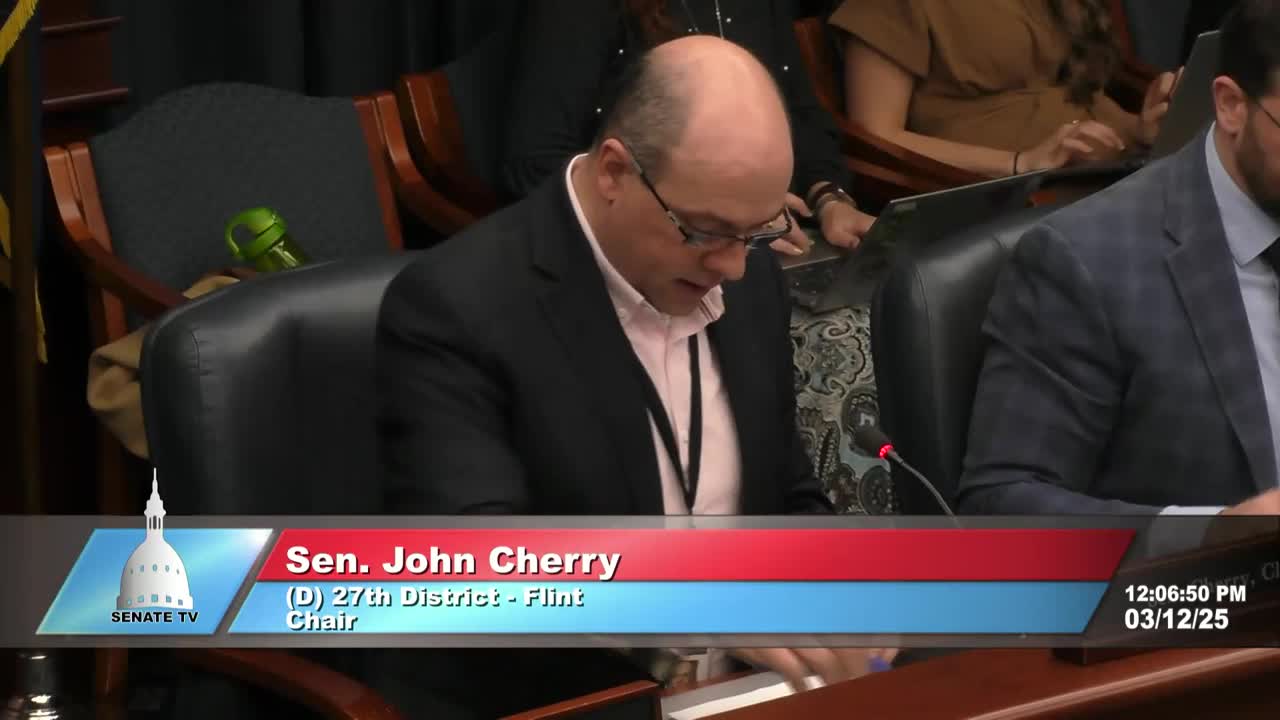DNR requests license, registration and one-time funding increases in FY2026 executive budget
Get AI-powered insights, summaries, and transcripts
Subscribe
Summary
The Appropriations Subcommittee on Agriculture and Natural Resources heard a presentation on the governor’s FY2026 executive budget recommendation for the Department of Natural Resources on Oct. 12, 2025, focusing on proposed fee increases, an opt-out recreation passport model and one-time general fund investments to address deferred maintenance across parks, fisheries and dam infrastructure.
The Appropriations Subcommittee on Agriculture and Natural Resources heard a presentation on the governor’s FY2026 executive budget recommendation for the Department of Natural Resources on Oct. 12, 2025, focusing on proposed fee increases, an opt-out recreation passport model and one-time general fund investments to address deferred maintenance across parks, fisheries and dam infrastructure.
Subcommittee staff member Jonah Hoots of the Senate Fiscal Agency opened the briefing with a summary of the recommendation and baseline adjustments. Director Bowen and Dan Lord, chief of finance and operations for the Department of Natural Resources, responded to questions and outlined the department’s priorities and estimates.
Why it matters: DNR manages more public land and water-related assets than any other Michigan agency and funds much of its work from restricted fees tied to hunting, fishing, boating and recreation. Officials said revenue shortfalls and inflation-driven cost increases have forced deferred maintenance, staffing reductions and cuts to routine operations that they said now risk greater emergency costs.
“The investment will support the hunting, fishing, boating, and tourism industries by providing critical revenue to the state for infrastructure, preventative maintenance, and programs,” Dan Lord said during the presentation.
What the budget proposes
- Fee and registration changes: The governor’s recommendation includes a proposal that would increase hunting and fishing license fees (the department estimated total restricted revenue increases of about $29,000,000) and raise watercraft registration fees. DNR officials described hunting and fishing fee increases in the “30–60%” range and total boating registration increases of just under 73% in the package submitted to the budget office. The watercraft proposal was estimated to generate an initial $3,500,000 for the waterways fund (about $2,500,000 to Parks and Recreation and roughly $1,000,000 for the waterways grants program) and $3,400,000 to the Marine Safety Program, including an estimated $1,600,000 in additional marine-safety grants to county sheriffs.
- Recreation passport opt-out and veteran exemption: The budget includes a move from the current opt-in recreation passport to an opt-out model. DNR staff estimated that raising participation to 60% under an opt-out model would yield approximately $21,300,000 in additional revenue but noted an offset of about $4,100,000 if resident veterans remain exempt under the proposal. DNR said the formula for distributing passport revenue is defined in statute.
- One-time general fund investments and technical increases: The package requests $15,000,000 one-time general fund for dam safety management and removal and $6,400,000 one-time general fund for the department’s enterprise asset management system (phase two). Other items included supplemental requests for $41,800,000 in Natural Resources Trust Fund grants (resulting from the 2024 grant cycle) and $6,500,000 one-time available revenue from investment returns in the Game and Fish Protection Trust Fund.
Officials also asked for modest adjustments to spending authority: roughly $481,000 in federal authorization to support 7.5 FTEs for federal shooting-range operation and maintenance and $355,000 in state-restricted authorization to support three FTEs for recruitment and retention in state parks.
Department condition and examples
DNR officials emphasized the cumulative effect of long-term deferred maintenance. Lord said fisheries assets alone exceed $350,000,000 in value, and that the wildlife and fisheries divisions estimate deferred infrastructure needs of about $140,000,000 (excluding dams). He cited three concrete examples: the Black River Dam failure, which drained an approximately 10-acre impoundment and whose initial restoration estimate was about $3,000,000 plus roughly $2,800,000 to mitigate newly formed wetlands; a partial failure at a Wolf Lake Hatchery rearing pond; and a generator fire at Wolf Lake State Fish Hatchery that left the department renting temporary power while awaiting a replacement unit with a 52-week lead time.
Lord also described year-to-year cost increases in routine items the department said are driving the request: fish feed costs up 71% compared with several years ago, liquid oxygen for hatcheries up 32% from 2013 to 2023, and chassis and law-enforcement vehicle costs that have roughly doubled since 2014. He said annual fuel and maintenance costs for the Law Enforcement Division—whose staff average roughly 4,320,000 miles per year—contribute materially to operating pressure.
Questions and follow-ups
Members asked for more granular breakdowns. When asked what portion of the $29,000,000 estimate was specifically boating revenue versus hunting and fishing, Jonah Hoots said he did not have that exact breakdown on hand but offered to provide it later. When asked about the revenue ramping timeline for the watercraft registration proposal, Dan Lord described a tiered approach in the request intended to ramp increases over time and offered to revisit detailed slides and numbers with the committee.
Formal actions
At the start of the meeting the subcommittee approved, by unanimous consent, a procedural motion to excuse absent members. Senator Bumstead seconded the motion; the chair announced, “Without objection, absent members are excused from today's meeting.”
What did not change
No formal vote was taken on any fee or budget recommendation during this meeting. DNR officials presented the governor’s executive recommendation and answered senators’ questions; further committee work or legislative action would be required to adopt fee changes, opt-out rules for the recreation passport, or the proposed one-time appropriations.
Next steps
DNR staff committed to supplying the committee with additional breakdowns and the department agreed to revisit slide-level revenue projections for the boating and license proposals. The subcommittee did not take further action at this session and adjourned after questions.
Ending
Committee members and DNR officials emphasized the economic importance of outdoor recreation to many Michigan communities and the department’s argument that modest revenue adjustments and one-time investments would reduce deferred maintenance and lower the risk of larger emergency costs in future years.
